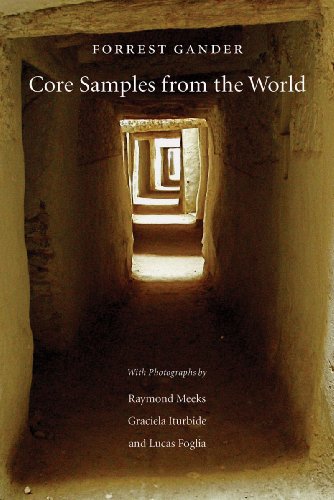
Core Samples from the World
- اطلاعات
- نقد و بررسی
- دیدگاه کاربران
نقد و بررسی

Starred review from May 16, 2011
Gander is an experimental poet in the most literal sense of the word, in that each of his books attempts things that haven't been tried before, either by him or others. In this eighth collection, four sequences of poems respond to pictures by three photographersâRaymond Meeks, Graciela Iturbide, and Lucas Fogliaâmaking of the images metaphors for people and places that are easy to see but difficult to penetrate. The poems don't describe the pictures so much as work in chorus with them; in a poem on whose facing page is a Meeks photo of a shirtless, dust-covered boy carrying a basket, Gander writes: "I cannot be discarded, his eyes say," which is as much a response to the picture as it is a challenge to the visitor to take the unfamiliar place on its own terms. Concluding each section is a piece of jumpy prose, a kind of lyric essay, narrating one of four journeysâto Xinjiang, Mexico, Bosnia-Herzegovina. and Chileâall of which serve to illustrate that "Behind everything/ the foreigner sees, something he doesn't/ know how to look for." In these pieces, Gander gets as close as one can to the sensations of being an outsider straining toward empathy: "I wanted to borrow eyes/ from another language," he writes. "I was looking for the words to come."

May 15, 2011
A foreigner with poetry as his passport, Pushcart/Whiting award winner Gander (Eye Against Eye) takes "core samples" of the cultures he finds on journeys to China, Mexico, Chile, and Bosnia and Herzegovina and presents them in a blend of poetry, haibun (a Japanese form of essay-poem), and photography (by a trio of others). "Did you know Bosnia is the only country without a McDonald's?" a new friend in Sarajevo asks him; while in San Luis Potosi, another man points out Julieta, owner of "the most famous legs in Mexico," since they were caught on video when tossed into the air by a renegade bull. In Beijing, Gander marvels at what "appears to be a casino boat on the lake," ornate and beautiful, "carved from ocherous marble." But not all is easygoing: "At dinner, the Santiago poet averts her face from the gringo.... A synecdoche, he is taken for his government.... With suspicion at the threshold of dialogue, there is always a word blocking the first word." VERDICT This impressive compendium takes us to corners of the world well worth seeing, particularly through Gander's eyes. Recommended for all readers of contemporary poetry.--Louis McKee, Painted Bride Arts Ctr., Philadelphia
Copyright 2011 Library Journal, LLC Used with permission.

May 15, 2011
A poet with a geology degree (as well as a translator and Rockefeller, Guggenheim, and NEA fellow), Gander is an envoy between art and science, nature and politics. In his newest collection, he combines poetry, journal-like essay-poems, and photographs in an intimate inquiry into what it means to be a foreigner. Yoking fact and metaphor, anecdote and empathy, Gander writes with warmth, humor, and concern about his sojourns in China, Mexico, Chile, and Bosnia-Herzegovina. In his poetic responses to the evocative photographs of Raymond Meeks, Graciela Iturbide, and Lucas Foglia, he maps diverse landscapes, from a cauterized topography on which emaciated workers are ghosted with dust, to the lush American South of warbler-quickened birches and pawpaws clumped along the creek to the Mexican desert where plastic bags are snagged in towering cacti. Gander tenderly portrays writers at international conferences addled by simultaneous translation, young men weary of war, a back-to-the-wild commune, and patients in a clinic. Each a stranger to the others strangeness. Wry and glimmering, Ganders border crossings and core samples illuminate places that grant revelations bemusing and profound.(Reprinted with permission of Booklist, copyright 2011, American Library Association.)




دیدگاه کاربران